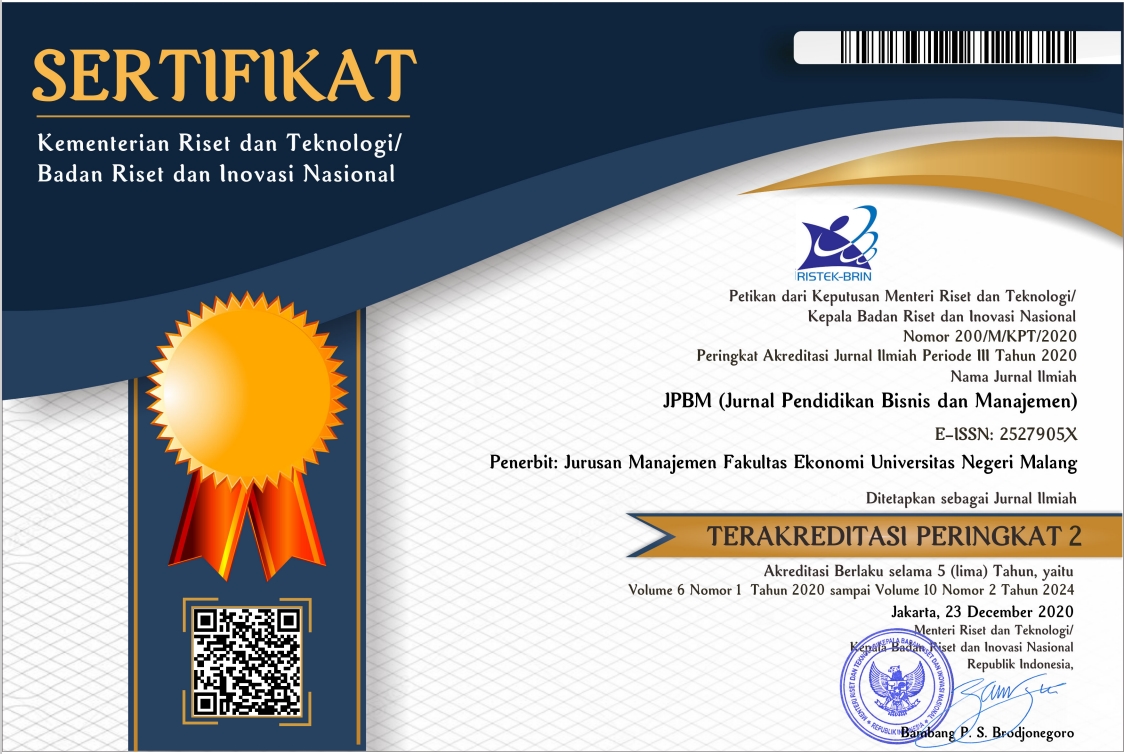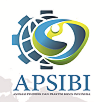The Role of Organizational Learning Capability as the Mediator between Entrepreneurial Orientation and Organizational Performance in Public Organization
Abstract
To meet public expectations for excellent public services and good governance, the government must implement bureaucratic reform. Applying entrepreneurial principles to public organizations can boost effectiveness and efficiency in public service delivery while also fostering public values and accomplishing predetermined goals. This study investigates how the performance of public organizations is impacted by an entrepreneurial mindset. A survey of 226 managers at the Directorate General of State Assets Management, one of the Indonesian Ministry of Finance's vertical agencies, was undertaken for this study. This study used quantitative methods, and the data were analyzed using Smart-PLS. According to the findings, entrepreneurial orientation significantly and positively affects organizational performance, with organizational learning capability serving as a mediating factor in this relationship. The findings of this study have implications for how entrepreneurial orientation may boost innovation and flexibility, which in turn can help organization perform better. Organizational learning capability also helps to increase performance inside the company by enhancing the capacity to acquire and distribute information throughout the whole organization.
Keywords: Entrepreneurial orientation, Organizational learning capability, Organizational performance, Public entrepreneurship
Full Text:
PDFReferences
Al-Dhaafri, H. S., Al-Swidi, A. K., & Yusoff, R. Z. Bin. (2016). The mediating role of total quality management between the entrepreneurial orientation and the organizational performance. The TQM Journal, 28(1), 89–111. https://doi.org/10.1108/TQM-03-2014-0033
Al-Dhaafri, H. S., & Alosani, M. S. (2020). Impact of total quality management, organisational excellence and entrepreneurial orientation on organisational performance: empirical evidence from the public sector in UAE. Benchmarking: An International Journal, 27(9), 2497–2519. https://doi.org/10.1108/BIJ-02-2020-0082
Al-Shami, S. A., Alsuwaidi, A. K. M. S., & Akmal, S. (2022). The effect of entrepreneurial orientation on innovation performance in the airport industry through learning orientation and strategic alignment. Cogent Business & Management, 9(1). https://doi.org/10.1080/23311975.2022.2095887
Alegre, J., & Chiva, R. (2013). Linking entrepreneurial orientation and firm performance: The role of organizational learning capability and innovation performance. Journal of Small Business Management, 51(4), 491–507. https://doi.org/10.1111/jsbm.12005
Anwar, M., Clauss, T., & Issah, W. B. (2022). Entrepreneurial orientation and new venture performance in emerging markets: the mediating role of opportunity recognition. Review of Managerial Science, 16(3), 769–796. https://doi.org/10.1007/s11846-021-00457-w
Balasubramanian, S., Yang, Y., & Tello, S. (2020). Does university entrepreneurial orientation matter? Evidence from university performance. Strategic Entrepreneurship Journal, 14(4), 661–682. https://doi.org/10.1002/sej.1341
Birasnav, M., Chaudhary, R., & Scillitoe, J. (2019). Integration of social capital and organizational learning theories to improve operational performance. Global Journal of Flexible Systems Management, 20(2), 141–155. https://doi.org/10.1007/s40171-019-00206-9
Brownhilder, N. (2017). Examining the moderating effect of environmental hostility on the entrepreneurial orientation-performance relationship. Journal of Economics and Behavioral Studies, 8(6), 6–18. https://doi.org/10.22610/jebs.v8i6(J).1479
Camps, J., Alegre, J., & Torres, F. (2011). Towards a methodology to assess organizational learning capability. International Journal of Manpower, 32(5/6), 687–703. https://doi.org/10.1108/01437721111158279
Chiva, R., Alegre, J., & Lapiedra, R. (2007). Measuring organisational learning capability among the workforce. International Journal of Manpower, 28(3/4), 224–242. https://doi.org/10.1108/01437720710755227
Covin, J. G., & Slevin, D. P. (1988). The influence of organization structure on the utility of an entrepreneurial top management style. Journal of Management Studies, 25(3), 217–234. https://doi.org/10.1111/j.1467-6486.1988.tb00033.x
Dess, G. (2003). Emerging issues in corporate entrepreneurship. Journal of Management, 29(3), 351–378. https://doi.org/10.1016/S0149-2063(03)00015-1
Dewi, E. P. (2018). Good governance dan transparansi rencana strategi terwujudnya akuntabilitas kinerja pemerintah. Jurnal Lentera Bisnis, 7(2), 81. https://doi.org/10.34127/jrlab.v7i2.236
Esendemir, N., & Zehir, C. (2017). The mediating effect of organizational learning and technological capability. International Journal of Research in Business and Social Science, 6(4), 48–60. https://doi.org/10.20525/ijrbs.v6i4.747
Gomes, G., Seman, L. O., Berndt, A. C., & Bogoni, N. (2022). The role of entrepreneurial orientation, organizational learning capability and service innovation in organizational performance. Revista de Gestão, 29(1), 39–54. https://doi.org/10.1108/REGE-11-2020-0103
Hair, J. F., Hult, G. T., Ringle, C., & Sarstedt, M. (2017). A Primer on Partial Least Squares Structural Equation Modeling (PLS-SEM) - Joseph F. Hair, Jr., G. Tomas M. Hult, Christian Ringle, Marko Sarstedt. In Sage.
Haveri, A. (2006). Complexity in local government change: Limits to rational reforming. Public Management Review, 8(1), 31–46. https://doi.org/10.1080/14719030500518667
Kaplan, R. S., & Norton, D. P. (2005). The balanced scorecard: Measures That drive performance. Harvard Business Review, 83(7–8).
Kim, Y. (2010). Stimulating entrepreneurial practices in the public sector. Administration & Society, 42(7), 780–814. https://doi.org/10.1177/0095399710377432
Kirn, S. (1997). Cooperative knowledge processing - Research framework and application perspectives (pp. 1–25). https://doi.org/10.1007/978-1-4471-3042-0_1
Kordab, M., Raudeliūnienė, J., & Meidutė-Kavaliauskienė, I. (2020). Mediating role of knowledge management in the relationship between organizational learning and sustainable organizational performance. Sustainability, 12(23), 10061. https://doi.org/10.3390/su122310061
Lechner, C., & Gudmundsson, S. V. (2014). Entrepreneurial orientation, firm strategy and small firm performance. International Small Business Journal: Researching Entrepreneurship, 32(1), 36–60. https://doi.org/10.1177/0266242612455034
Lumpkin, G. T., & Dess, G. G. (1996). Clarifying the entrepreneurial orientation construct and linking it to performance. Academy of Management Review, 21(1), 135–172. https://doi.org/10.5465/amr.1996.9602161568
Mafini, C., & Pooe, D. R. I. (2013). Performance measurement in a south african government social services department: A balanced scorecard approach. Mediterranean Journal of Social Sciences. https://doi.org/10.5901/mjss.2013.v4n14p23
Makhloufi, L., Laghouag, A. A., Ali Sahli, A., & Belaid, F. (2021). Impact of entrepreneurial orientation on innovation capability: The mediating role of absorptive capability and organizational learning capabilities. Sustainability, 13(10), 5399. https://doi.org/10.3390/su13105399
Mantok, S., Sekhon, H., Sahi, G. K., & Jones, P. (2019). Entrepreneurial orientation and the mediating role of organisational learning amongst Indian S-SMEs. Journal of Small Business and Enterprise Development, 26(5), 641–660. https://doi.org/10.1108/JSBED-07-2018-0215
Meynhardt, T., & Diefenbach, F. E. (2012). What drives entrepreneurial orientation in the public sector? Evidence from Germany’s federal labor agency. Journal of Public Administration Research and Theory, 22(4), 761–792. https://doi.org/10.1093/jopart/mus013
Miller, D. (1983). The correlates of entrepreneurship in three types of firms. Management Science, 29(7), 770–791. https://doi.org/10.1287/mnsc.29.7.770
Morris, M. H., & Jones, F. F. (1999). Entrepreneurship in established organizations: The case of the public sector. Entrepreneurship Theory and Practice, 24(1), 71–91. https://doi.org/10.1177/104225879902400105
Oktavio, A., Kaihatu, T. S., & Kartika, E. W. (2019). Learning orientation, entrepreneurial orientation, innovation and their impacts on new hotel performance: Evidence from Surabaya. Jurnal Aplikasi Manajemen, 17(1), 8–19. https://doi.org/10.21776/ub.jam.2019.017.01.02
Onu, A. J. C. (2013). Stimulating entrepreneurship in educational institutions in Nigeria. European Scientific Journal, 9(25), 1857–7881.
Oviedo-García, M. Á., Castellanos-Verdugo, M., García Del Junco, J., & Riquelme-Miranda, A. (2014). Organizational learning capacity and its impact on the results in a government agency in Chile. International Public Management Journal, 17(1), 74–110. https://doi.org/10.1080/10967494.2014.874263
Putu S., N., Jan van Helden, G., & Tillema, S. (2007). Public sector performance measurement in developing countries. Journal of Accounting & Organizational Change, 3(3), 192–208. https://doi.org/10.1108/18325910710820265
Rezaei, R., & Amin Fanak, D. (2019). Mediation effect of organizational learning on the relationship between entrepreneurial orientation and organizational performance in the agriculture jihad organization of West Azerbaijan province, Iran. Journal of Agricultural Science and Technology, 21(1), 37–50.
Rofiaty, R. (2019). The relational model of entrepreneurship and knowledge management toward innovation, strategy implementation and improving Islamic boarding school performance. Journal of Modelling in Management, 14(3), 662–685. https://doi.org/10.1108/JM2-05-2018-0068
Ruba, R. M., van der Westhuizen, T., & Chiloane-Tsoka, G. E. (2021). Influence of entrepreneurial orientation on organisational performance : Evidence from Congolese higher education institutions. Journal of Contemporary Management, 18(1), 243–269. https://doi.org/10.35683/jcm1914e.104
Soininen, J., Martikainen, M., Puumalainen, K., & Kyläheiko, K. (2012). Entrepreneurial orientation: Growth and profitability of Finnish small- and medium-sized enterprises. International Journal of Production Economics, 140(2), 614–621. https://doi.org/10.1016/j.ijpe.2011.05.029
Swann, W. L. (2017). Modelling the relationship between entrepreneurial orientation, organizational integration, and programme performance in local sustainability. Public Management Review, 19(4), 542–565. https://doi.org/10.1080/14719037.2016.1199729
Teklemariam, M. F., & Guohua, W. (2021). Good governance & government performance: Empirical evidence from ethiopian public sectors. The Case of Hosaena City Administration. Studies in Social Science Research, 2(1), 53. https://doi.org/10.22158/sssr.v2n1p53
van Helden, G. J., & Reichard, C. (2013). A meta-review of public sector performance management research. Tékhne, 11(1), 10–20. https://doi.org/10.1016/j.tekhne.2013.03.001
Wang, C. L. (2008). Entrepreneurial orientation, learning orientation, and firm performance. Entrepreneurship Theory and Practice, 32(4), 635–657. https://doi.org/10.1111/j.1540-6520.2008.00246.x
Yuniarto, P. R. (2015). Masalah globalisasi di Indonesia. Jurnal Kajian Wilayah, 5(1), 67–95.
DOI: http://dx.doi.org/10.17977/um003v9i32023p234
Refbacks
- There are currently no refbacks.
JPBM (Jurnal Pendidikan dan Bisnis Manajemen) is licensed under a Creative Commons Attribution-NonCommercial-ShareAlike 4.0 International License.
JPBM (Jurnal Pendidikan dan Bisnis Manajemen) is abstracted and indexed in :
















